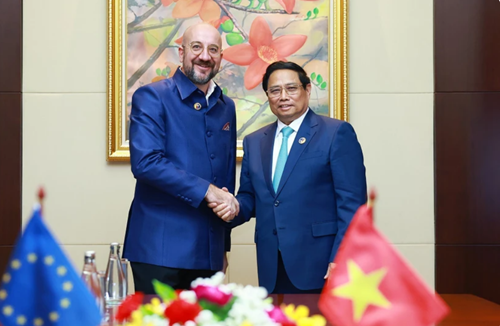Both leaders expressed their satisfaction with the robust, intensive and extensive development of the relationship between Vietnam and the E.U., particularly in economy, trade, and investment cooperation since the E.U.-Vietnam Free Trade Agreement (EVFTA) came into effect in 2020.
    |
 |
|
Prime Minister Pham Minh Chinh (right) meets with President of the European Council (E.C.) Charles Michel. |
They agreed to further expand and deepen the bilateral cooperation in line with its potential, increase high-level exchanges and meetings, and remove existing obstacles and barriers to trade and investment, and promote effective cooperation in such emerging areas as digital economy, artificial intelligence, innovation, green transition, and climate change response.
Chinh urged the E.U. to continue encouraging remaining member states to swiftly ratify the E.U.-Vietnam Investment Protection Agreement (EVIPA) and lift yellow card warning against Vietnam’s seafood exports.
On this occasion, he expressed heartfelt gratitude to the E.U. for providing 650,000 EUR in humanitarian aid to help Vietnam overcome the consequences of recent Typhoon Yagi.
Hailing Vietnam as a key partner in the E.U.’s Indo-Pacific Strategy, Michel affirmed the E.U.’s commitment to speed up the EVIPA ratification. He also indicated the E.U.’s positive consideration of lifting the yellow card against Vietnam’s seafood exports and pledged continued support for Vietnam’s effective implementation of the Just Energy Transition Partnership (JETP) framework.
Regarding global issues, both sides underscored the importance of adhering to international law and the United Nations Charter, and close coordination at global and regional multilateral forums.
Michel expressed the E.U.'s desire to join hands with Vietnam and other ASEAN members to further deepen the E.U. - ASEAN partnership and affirmed its support for ASEAN’s central role and common stance on regional issues, especially the East Sea and Myanmar-related matters.
The two leaders emphasized the importance of ensuring security, safety and freedom of navigation and overflight in the East Sea, settling disputes by peaceful measures in accordance with international law, including the United Nations Convention on the Law of the Sea (UNCLOS) 1982, contributing to peace, stability and common prosperity in the region and the world.
Source: VNA